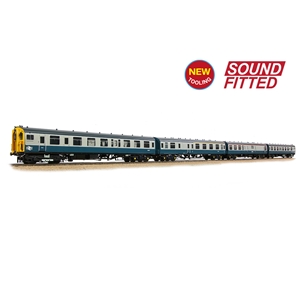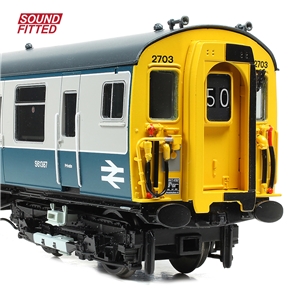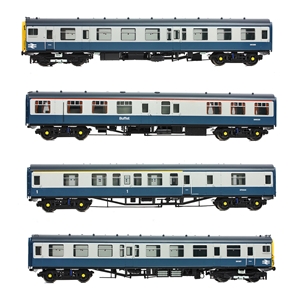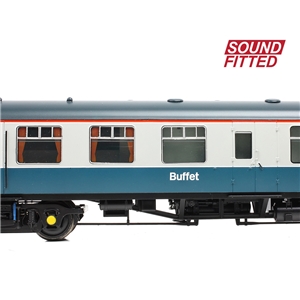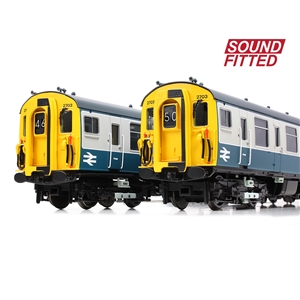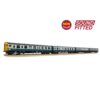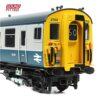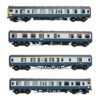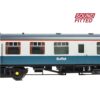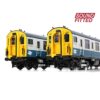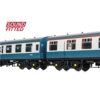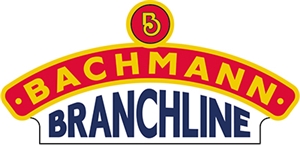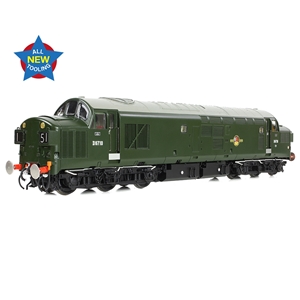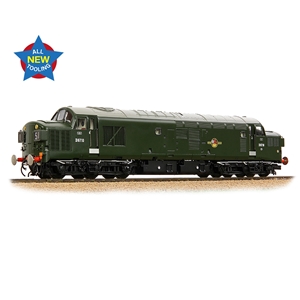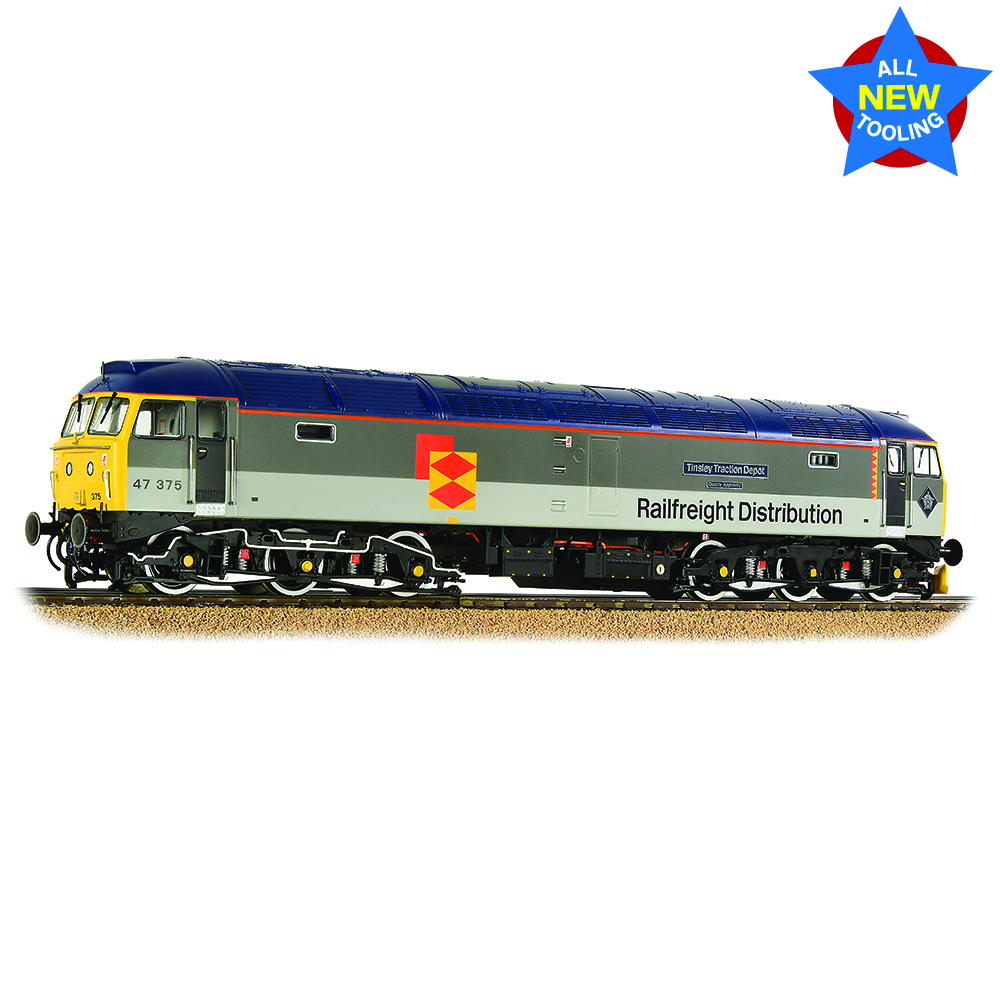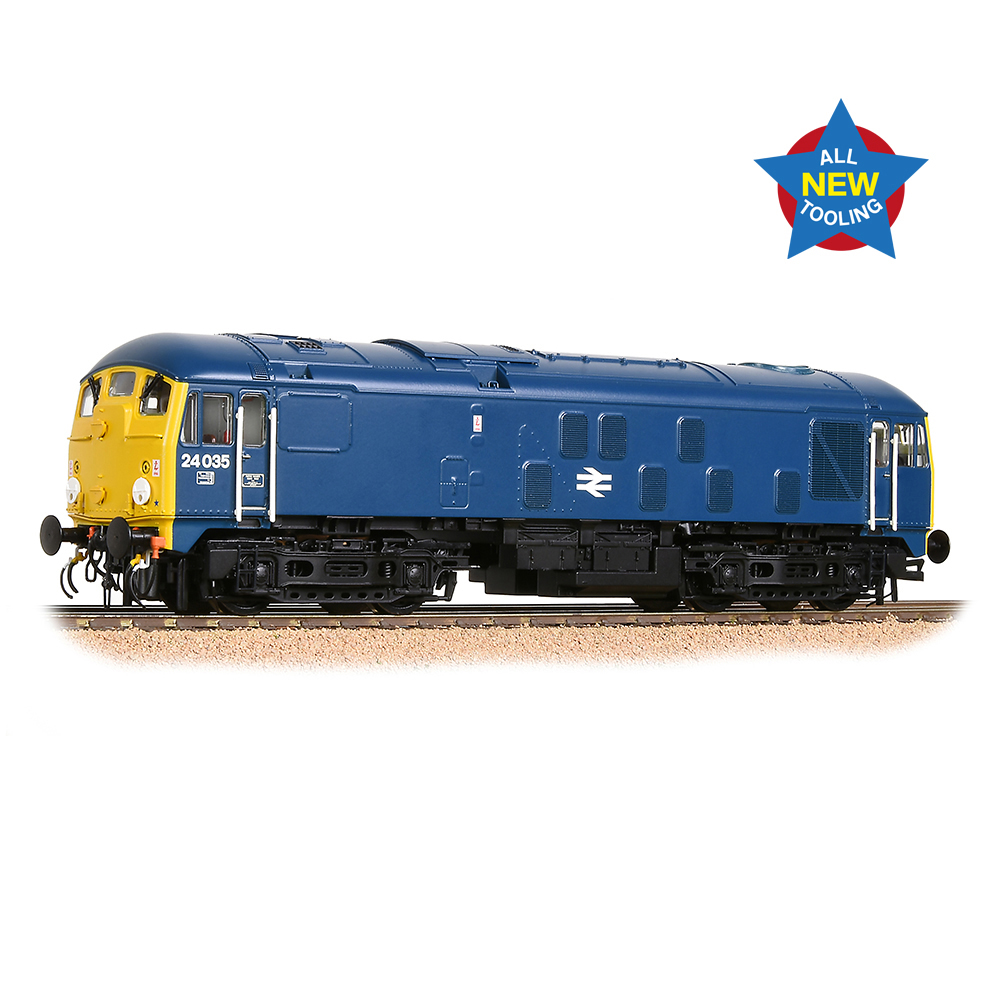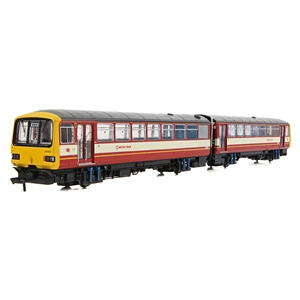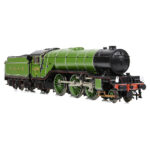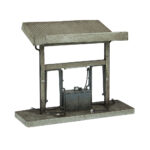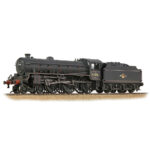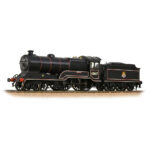The Bachmann Branchline 4-CEP Electric Multiple Unit (EMU) broke new ground when it was first released and now we’ve created new bodyshells for this award winning model to bring you these new models depicting the refurbished units. With the fitting of hopper ventilator windows and the relocation of the two guard’s compartments from the driving vehicles to a single location in the trailer vehicle, the changes made at refurbishment were drastic and we’ve captured them all in this new Branchline model which depicts 4-TEP No. 2703 in BR Blue & Grey livery.
Each of the four vehicles that make up this 4-car set is adorned with fine detail from the door handles, hinges and bumpers to the window frames picked out so neatly in silver. Metal wire handrails are fitted at each end of the two DMSO vehicles, and the multiple working equipment, windscreen wipers and roof mounted horns are all fitted separately. Metal handrails also feature aside the guard’s door and metal toilet filler pipes can be found at each end of the TBCK vehicle. The fourth vehicle takes the form of the TRB from the Bachmann Branchline 4-BEP, this un-refurbished vehicle providing a stark contrast to the Refurbished CEP cars.
Underneath each vehicle the truss frames and brake gear is depicted, along with a full set of auxiliary equipment and boxes. At the driving end of each DMSO Mark 4 Motor Bogies can be found, fitted with their third-rail pickup shoes, whilst throughout the rest of the train Commonwealth Bogies are fitted. Through the tinted windows the tables, chairs and compartments are all the more visible thanks to the interior lighting, whilst the cab is fitted with driver’s seat, control desk and brake wheel.
With conductive couplings employed between each vehicle, mounted on close-coupling mechanisms, NEM coupling pockets are also fitted at each end allowing multiple units to be coupled together. Each wheelset is fitted with electrical pickups and a single 21 Pin decoder is required to use the model on DCC, or why not opt for a SOUND FITTED model which comes pre-fitted with a ESU Sound Decoder to provide authentic sound effects on DCC or Analogue Control straight out of the box.
MODEL FEATURES:
- Bachmann Branchline OO Scale
- Era 8
- Pristine BR Blue & Grey Livery
- Set No. 2703
- 4-Car Unit comprising DMSO Nos. S61386 & S61387, TBCK No. S70344 and TRB No. S69020
- Accessory Pack
- NEM Coupling Pockets at the outer ends
- Integral conductive couplings mounted on close-coupling mechanisms between vehicles
- Interior Lighting
- Directional Lighting (leading end)
- SOUND FITTED – Fitted with a ESU Loksound V5DCC Sound Decoder – See below for the function list
- Length 1070mm
SOUNDS
F0 – Directional Lights – On/Off
F1 – Sound – On/Off
F2* – Brake
F3** – Air Horn (High)
F4** – Air Horn (Various)
F5 – Primary Load
F6 – Southern Region Whistle
F7 – 3rd Rail Arcing
F8*** – Coupling
F9 – Flange Squeal
F10 – On – Guard’s Whistle / Off – Driver’s Response
F11 – Saloon Lighting
F12 – On – Driver’s Single Buzzer / Off – Guard’s Response
F13 – On – Driver’s Double Buzzer / Off – Guard’s Response
F14 – On – Cab Door Opening / Off – Cab Door Closing
F15 – On – Passenger Doors Opening / Off – Passenger Doors Closing
F16 – AWS Horn
F17 – Air Tank Drain Down
F18 – Fade All Sounds
F19 – Mute (Latch) / Volume Cycles 6 Levels (Trigger)
F20 – Compressor
F21**** – Rail Clank
F22 – Spirax Valve
F23 – Windscreen Wipers
* Alterative Brake sounds can be selected via CV changes
**Alternative Horn characteristics can be selected via CV changes
*** Alternative Coupling sounds can be selected via CV changes
**** Alternative Rail Clank sound can be selected via CV change
Analogue Users: Please note that normal load running sounds and any other automatic or randomised sounds will also operate when this model is used on analogue control (DC) straight from the box!
CEP/TEP HISTORY
The Corridor Electro Pneumatic (CEP) Electric Multiple Units (EMUs) were designed and built as part of the Kent Coast Electrification Scheme. First conceived in 1946 by the Southern Railway (SR) but halted by Nationalisation in 1948, the SR’s plans re-emerged as part of the British Transport Commission’s ‘Modernisation Plan’ in 1955. Built as 4-coach units, the first 4-CEPs emerged from Eastleigh Works in 1956 formed of two Driving Motor Brake Seconds (DMBS), a Trailer Second Corridor (TSK) and a Trailer Composite Corridor (TCK). Using the standard BR Mk1 Coach profile, many Mk1 fittings like windows and doors were employed on the CEPs which were named so because they were corridor units which were fitted with electro pneumatic brakes, in addition to their Westinghouse automatic air brakes.
A total of 111 4-CEPs were built between 1956 and 1963 along with 22 4-BEPs which featured a Trailer Restaurant Buffet (TRB) in place of the TSK. The first units entered service on the Central division, whilst the majority were allocated to the South Eastern division and a small batch was ordered for use on the South Western division. In addition to the 4-CEPs and 4-BEPs, ten Motor Luggage Vans (MLVs) were built and 13-coach train formations consisting two 4-CEPs, a 4-BEP and a MLV were employed on boat trains operating between London and Kent’s channel ports.
By the 1970s the units were showing their age and with no funding available to replace the fleet, a refurbishment programme was initiated with the work undertaken at BR’s Swindon Works, following the successful trial refurbishment of the first unit at Eastleigh Works. Interiors were stripped and the blue asbestos insulation removed. DMBS vehicles had their guard’s compartment removed and they were converted to Driving Motor Second Opens (DMSO) whilst the TSK was rebuilt as a Trailer Second Open (TSO). The TCK remained as a corridor vehicle becoming a Trailer Brake Composite (TBCK), with a new guard’s compartment fitted between the first class accommodation and the sole remaining second class compartment. The change of layout coupled with the fitting of hopper ventilator windows gave the units a drastically different appearance, both internally and externally, from their original form.
During the 1980s four Temporary BEP units, designated 4-TEP, were formed to provided replacement units with catering facilities whilst 4-BIG units were being refurbished. The units comprised a refurbished 4-CEP which had a TRB vehicle from an un-refurbished BEP marshalled in place of the TSO. Once this role had been fulfilled, the units were reformed as 4-CEPs and the TRB vehicles were later scrapped.
Following Sectorisation Network SouthEast livery was applied and after Privatisation in the mid-1990s, the CEPs were inherited by three operators; Connex South Central, South Eastern Trains and South West Trains. By now, some units had been reduced to 3-cars and others followed, with the TSO vehicle – which had seen the least bodywork undertaken during refurbishment and by now were suffering from corrosion – usually being the vehicle taken out to reduce sets to 3 cars. Wholesale withdrawals did not commence until the 21st century however, when new units were delivered during a push to eliminate ‘slam-door’ rolling stock for reasons of safety and modernisation. The final unit in traffic was 4-CEP No. 1698 which was withdrawn in September 2005, bringing to an end 49 years of operations and making the CEPs the longest-lived BR Mk 1 EMUs.

